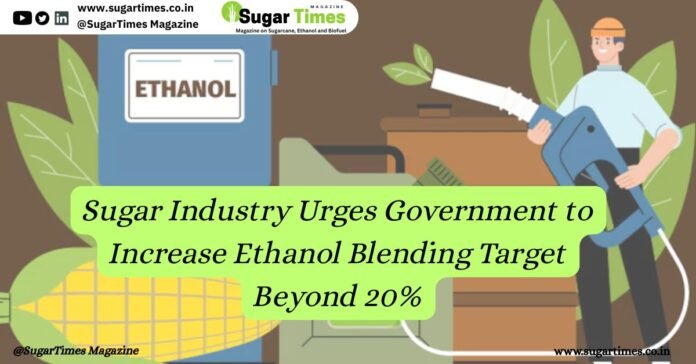New Delhi | October 25, 2025
India’s sugar industry has urged the government to plan for ethanol blending levels beyond 20%, recommending a clear roadmap to move towards 27% blending (E27). The industry believes this will help make full use of its growing ethanol production capacity and further support India’s clean energy and biofuel goals.
Industry Ready for Higher Blending Targets
According to Deepak Ballani, Director General of the Indian Sugar and Bioenergy Manufacturers Association (ISMA), the sector has already invested over ₹40,000 crore and built an annual capacity of over 9,000 million litres of ethanol from sugarcane.
He said,
“We are fully capable of supporting blending beyond E20 — up to E27 and even higher. A well-defined national ethanol roadmap will help maintain growth, improve infrastructure use, ensure stable income for farmers, and boost rural industries.”
Ethanol Production Surpasses Demand
Ethanol producers have collectively offered 17,760 million litres for the upcoming supply year (2025–26), while oil marketing companies (OMCs) need only about 10,500 million litres.
Of this, around 4,710 million litres will come from sugarcane-based producers and 13,040 million litres from grain-based units using rice and maize.
Ballani warned that without a plan for higher blending, large production capacities could go underused, leading to financial losses and slower progress in India’s biofuel industry.
Grain-Based Units Seek Policy Support
Grain-based ethanol producers are also calling for higher blending targets and a temporary freeze on new plant approvals.
Chandra Kumar Jain, President of the Grain Ethanol Manufacturers Association, said,
“Many units are running at only 50% capacity. Without policy support or new blending goals, operations may become unviable since grain-based plants rely solely on ethanol production.”
Currently, India’s total ethanol capacity stands at around 17,000 million litres across 400 production units, including 250 grain-based plants. OMCs presently buy 11,000–12,000 million litres each year.
Economic and Policy Impact
India had advanced its 20% ethanol blending target from 2030 to 2025–26 under the revised National Policy on Biofuels (2018).
Since 2014–15, the ethanol programme has paid over ₹1.25 lakh crore to farmers and helped save more than ₹1.44 lakh crore in foreign exchange by cutting crude oil imports.
To build on this success, ISMA and the Indian Federation of Green Energy (IFGE) have jointly proposed a “National Ethanol Mobility Roadmap.” The roadmap would set blending targets beyond E20 and provide regulatory guidance to integrate ethanol more deeply into India’s transport fuel system.





